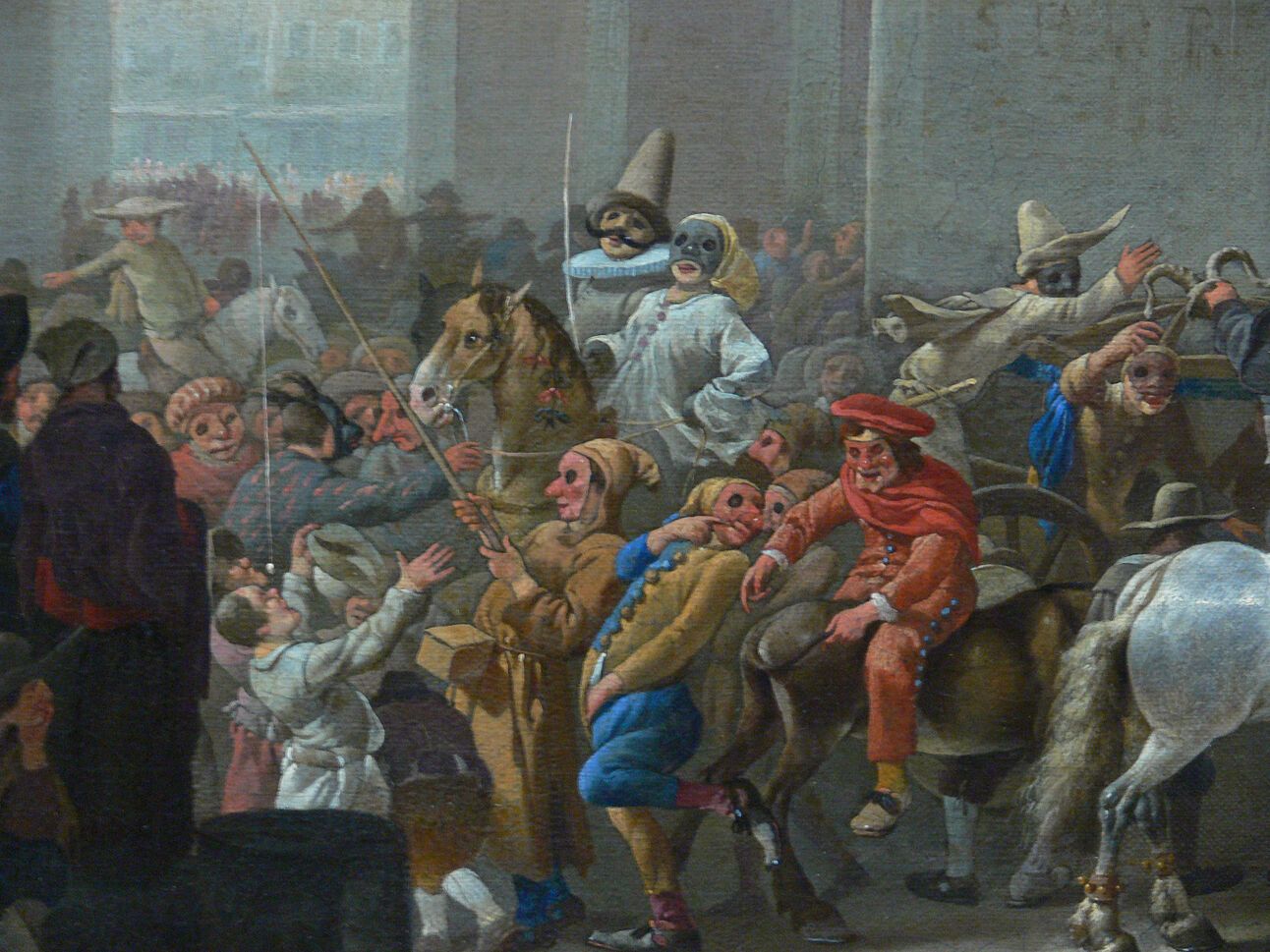
It's Saturday, February 17, 2024.
Today’s edition covers a Brazilian singer’s unexpected warning of the Apocalypse during Carnival, a controversial foot-washing Super Bowl commercial, some historical and biblical background for those two stories, and much more.
“The simple believes everything, but the prudent gives thought to his steps.” (Proverbs 14:15) — There are many things believers shouldn’t believe. We’re called to a thoughtful life. Here are some more things to think about.
Of Christian Concern
BRAZILIAN SINGER BABY DO BRASIL INTERRUPTS CARNIVAL TO WARN OF THE END TIMES

Screenshots of the unusual exchange between famous Brazilian singers Baby do Brasil (top) and Ivete Sangalo (bottom). (Bandplay)
Controversy erupted among evangelicals in Brazil this week after famous singer Baby do Brasil proclaimed the coming of the Apocalypse in the middle of Carnival (Carnaval, in Portuguese).
Carnaval—the annual pre-Lent festival for which Brazil is famous and which is known as an occasion of widespread debauchery—started last Friday and ends today. (See Church History Tidbit below to learn more about the festival.) The weeklong celebration has various expressions throughout the country, the greatest of which involve massive ornate processions with colorful, gaudy costumes (which are often related to the popular Afro witchcraft religions Candomblé and Umbanda). These large events invariably involve any number of famous singers performing atop their personal parade floats, called trio elétricos.
One of those singers is 71-year-old artist Baby do Brasil, also known as Baby Consuelo. She is a popular singer of many decades who professed faith in Christ in 1999, 30 years into her illustrious career, and quickly assumed the role of a “pastora” (female pastor). Controversially, she continued singing secular music.
In the early morning hours this past Sunday, during the Carnaval in Salvador, Baby delivered a surprise sermonette during an on-mic dialogue with fellow singer Ivete Sangalo. “I want to request something, to you and everybody. Everyone pay attention because we are entering the Apocalypse. The rapture has everything [it needs] to happen between five and ten years. Seek the Lord while it’s possible to find [Him].”
Sangalo, seemingly taken aback by the comment, responded that she would not let that happen, but would “macetar” (“pound,” in a sexual sense) the Apocalypse. “I will sing the pounding because God is commanding it,” she said, apparently mockingly.
This short, provocative back-and-forth caught the attention of the nation, with evangelical leaders of all stripes chiming in, some criticizing and some defending Baby. Critics say a Christian has no business being at Carnaval anyway, while defenders say she’s being a light in a dark place, preaching “in and out of season” (2 Timothy 4:2).
Her eldest daughter, an influential figure in Brazilian evangelicalism named Sarah Sheeva, also weighed in. In a live video, Sheeva explained her opinion that her mother is a genuine believer but was not discipled before being too quickly thrust into a preaching role mere months after her conversion. This, Sheeva believed, was her mother’s liberal church using her on account of her fame.
Sheeva says she can’t say whether her mother’s involvement in Carnaval is right—her mother believes that’s her calling, and that’s between her and God. Sheeva says God has used her mother many times. “When someone is used, is it a sign that the person is getting a pat on the back from God, saying ‘Very good! You’re doing everything I’m commanding’? No.”
A number of curious events have taken place since Baby and Sangalo’s viral exchange. The following day, Sangalo was reduced to tears after her trio elétrico suffered a number of problems, including an explosion that injured two people. The search term “apocalipse” began trending on Google in Brazil. And even the contestants on Big Brother Brasil, a show in which participants are shut off from the outside world and would not have heard about the situation, started discussing the “apocalipse.”
Also Noteworthy
→ A woman opened fire in famous preacher Joel Osteen’s megachurch on Sunday. Accompanied by her 7-year-old son, she walked into Lakewood Church in Houston, Texas, and exchanged gunfire with police officers on the scene. She was killed, her son was left in critical condition, and one other person was injured in the gunfight. Her son is “still struggling to survive.”
→ ‘He Gets Us,’ a campaign promoting the idea that “the story of Jesus belongs to everyone” sparked controversy with a provocative commercial that aired during the Super Bowl last weekend. The ad portrayed scenes of individuals washing people’s feet, alluding to Jesus’ actions in John 13. (See Content Catch-Up and The Bible, Briefly below for more on this.)
→ The Orthodox Church of Ukraine removed the day of memory of a medieval Russian leader, Prince Alexander of Novgorod, from the official church calendar.
→ Judges in the United Kingdom are concerned that Islamic immigrants are using fraudulent claims of Christian conversion to seek asylum and avoid deportation.
→ American preteens (ages 8 to 12) reject central biblical teachings about scripture, absolute truth, salvation, life purpose, and the definition of success, according to a new survey from Arizona Christian University’s Cultural Research Center.
→ Canterbury Cathedral held a “silent disco” last week, unintentionally making Christian singer-songwriter Steve Taylor’s satirical 1985 song “This Disco (Used to Be a Cute Cathedral)” literally come true.

Screenshot of Steve Taylor’s song on YouTube.
Content Catch-Up
Recent, notable content by Christian creators, or of Christian interest.*
→ A Biblical Theology of Abortion: In a two-part (nearly 4-hour) episode of Just Thinking Podcast, co-hosts Darrell Harrison and Virgil Walker define the issue of abortion from a biblical perspective. (Podcast: Part 1 and Part 2)
→ ‘He Gets Us’ Doesn’t Get Him: Joining the voices that have addressed the ‘He Gets Us’ Super Bowl commercial, I (Anthony Langer, Project 18:15 creator) take an in-depth look at the ad, plus surrounding issues, in my latest blog post. (Article)
→ Letter to the American Church: In a new documentary based on his book Letter to the American Church, Christian author Eric Metaxas evaluates—among other things— the similarities between the present day American church and the German church during the rise of the Nazi regime. The film challenges believers to “speak out, and take action in the face of evil.” (Film)
*Not necessarily an endorsement
The Bible, Briefly
The Meaning of Foot Washing

Jesus washing Peter’s feet, Mosaic in Rome. (Photo by BennoOosterom)
John 13 records how, when Jesus was eating the Passover meal with His disciples on the night before His crucifixion, He got up from the meal, wrapped a towel around His waist, and began washing and drying the disciples’ feet.
When He came to Peter, Peter objected, “You shall never wash my feet.” Jesus responded, “If I do not wash you, you have no share with me” (13:8).
That being the case, Peter said, “Lord, not my feet only but also my hands and my head!” (13:9).
“Jesus answered, ‘The one who has bathed does not need to wash, except for his feet, but is completely clean. And you are clean, but not every one of you.’ For he knew who was to betray him; that was why he said, ‘Not all of you are clean.’” (13:10-11)
Notice, as writer Samuel Sey points out, that Jesus “washed their feet to symbolize their spiritual cleansing from sin. This is why he said, ‘Unless I wash you, you have no part with me’ (John 13:8).”
The conversation with Peter makes clear that the spiritual cleansing symbolized here is a smaller, subsidiary washing to a “bath.” If we understand the “bath” to be the new birth which comes by faith in Christ—the washing away of our sins by His death on the cross—then we can understand the foot washing to be the forgiveness and restoration we experience throughout the Christian life when we slip up and sin, then repent and are restored.
Think of 1 John 1:9: “If we confess our sins, he is faithful and just to forgive us our sins and to cleanse us from all unrighteousness.”
Don’t forget to have Jesus wash your feet!
Church History Tidbit
Carnival and Lent, Explained

Carnival in Rome, c. 1650, Johannes Lingelbach. (Public Domain)
Carnival is “the merrymaking and festivity that takes place in many Roman Catholic countries in the last days and hours before the Lenten season.” Its connection to Lent, which is perhaps a more familiar observance to many within Christendom, leads to Carnival’s categorization (right or wrong) as “a Christian festive season”.
Lent is an occasion during which “Roman Catholics in earlier times fasted, abstained from eating meat, and followed other ascetic practices.” The rules were strict, with only a single evening meal permitted, during which “meat, fish, eggs, and butter were forbidden.” Today, the season remains for many observants a time of self-reflection and abstinence from certain personal pleasures, in “penitential preparation for Easter.”
Carnival, then, is the opposite: a time of excessive indulgence, as though to have one’s fill of pleasures prior to the deprivations of Lent. The origin of the word is uncertain, but it possibly comes from the Latin carnem levare (“to take away meat”), referring to Lent’s upcoming fasting.
The festival’s historical origin is likewise uncertain, but it may find its roots in pagan holidays like ancient Rome’s Saturnalia. Historian John Bossy, on the other hand, claims the practices were “medieval in origin,” with “no evidence that they existed much before 1200.”
Either way, it’s reported that “In earlier times Rome was most conspicuous as the centre of Carnival activity,” though nowadays “The most famous modern Carnival is perhaps that of Rio de Janeiro.”
What did you think of today’s briefing?


Know someone who would enjoy this?Please SHARE this newsletter




Have some feedback for me? Reply to this email with comments or suggestions. I’d love to hear from you!
Why "18:15"? The name Project 18:15 is based on Proverbs 18:15: “An intelligent heart acquires knowledge, and the ear of the wise seeks knowledge.” The aim is for this weekly email—a Christian news briefing, a Bible study, and a Church history lesson rolled into one—to be one way you keep abreast of current events and acquire knowledge you might not acquire elsewhere.
Unless otherwise indicated, all Scripture quotations are from The ESV® Bible (The Holy Bible, English Standard Version®), copyright © 2001 by Crossway, a publishing ministry of Good News Publishers. Used by permission. All rights reserved.

Copyright (C) " target="_blank">unsubscribe
